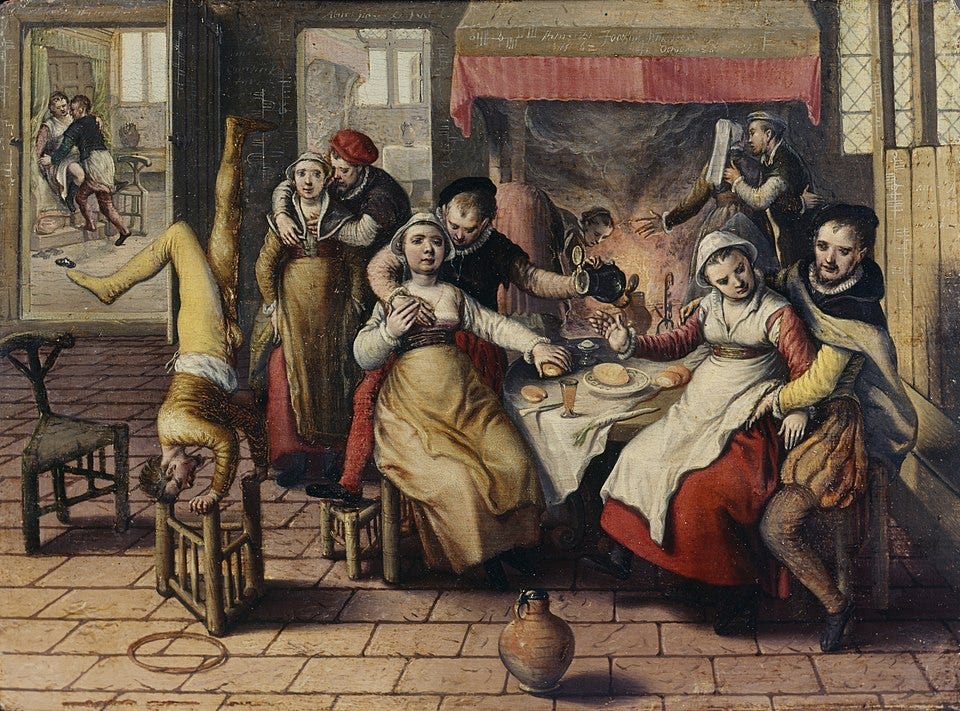Okay, I admit to knowing next to nothing about brothels. During a stint driving a cab in New York City, I used to take inquiring conventioneers over to Lexington Avenue, point to a building at random, and advise them, “Third floor, tell ‘em Lucky sent you.”
Yet it’s true that some of the most interesting history is what you find in your own backyard. I now live a bit south of the city of Hudson, New York, a two-square-mile burg on the Hudson River with an outsized history that revolved around houses of ill repute.
The town was settled in 1783 by Quakers from Nantucket, whale hunters who had moved to a fresh port to escape British raiders and bad limericks. They chose a spot with a favorable harbor some 150 miles inland from the Atlantic.
The great leviathans they harpooned were known as sperm whales. The name came from a cavity in the whale’s heads that was packed with spermaceti, a white, waxy substance that resembled human semen (it’s now thought to play a role in echolocation). This material was prized for making candles. Unlike smoky tallow candles, these burned cleanly with a bright light. The animals’ blubber was also boiled down for the oil used in lamps before kerosene.
Those who have pretended to read all of Moby Dick will remember that whaling ports in those days were rough haunts, filled with sailors, vagabonds, and those who made their living off them. Hudson took on some of that unsavory atmosphere, in part because the penny-pinching Quaker “Proprietors” would only pay for streetlamps two weeks of every month when the moon was farthest from full. Of course, darkness and sin are notorious bedfellows.
Speaking of beds, one by one a conglomeration of brothels opened up, most of them concentrated along Diamond Street on the city’s north side. They joined the many inns, taverns, gambling houses, blind pigs, and gin mills that catered to transients with money to spend. An industry was born.
A bad reputation can be good for business. Customers passed on the word to others — lonely men came from far and wide. By 1840, at the peak of the whaling trade, Diamond Street had already gained fame for “riotous gatherings.” The whole town was known for being “colorful.” It had become the “Sin Capital of the Northeast.”
The notoriety drew not just johns and out-of-towners seeking a good time but experienced prostitutes from New York City and other metropolises anxious to relieve clients of their yearning and their bankrolls. Most worked in brothels. Poverty and a lack of alternative employment for women meant an abundance of applicants.
The cavalcade of vice continued for more than a century. The prices in 1939 were $2.00 for a “straight party” ($46.00 in today’s currency), and $3.50 for a “Trip around the World.” Individual prostitutes would service as many as twenty clients a night. The “party” lasted for a maximum of twenty minutes, so it left the customers plenty of time to eat, drink and indulge in games of chance.
The sex trade was a boon to Hudson’s economy. There were sixty-five bars in town. Revelers would challenge each other to drink a beer in each one during a night of carousing. Horse racing dens and floating crap games, along with restaurants, hotels, and gas stations, all made out like bandits.
Madams could make $20,000 to $30,000 annually tax free — a policeman earned only a $2,000 salary. It wasn’t surprising that the whole thing was run as a business. Bordello owners would slide envelopes full of money through the mail slot for cops on the beat. A police chief during the 1920s would knock on the door, turn his back, and hold his right hand out behind him. The madam would fill it with cash. The chief saw nothing.
In 1926, during the heyday of Prohibition, the city tried the rather transparent ploy of changing the name of Diamond Street to Columbia Street. Nobody was fooled. There was a legend that the New York State legislature in Albany suspended business early on Fridays so that politicos could catch the trolley that ran straight to Hudson. Certainly the town’s reputation was well known on east coast military bases, a healthy source of revenues, especially during World War II.
But times changed. In the post-war years, women had better job opportunities in the respectable world. And loosening social mores meant that casual sex was more readily available without a charge.
For a while, the economics of desire still kept Hudson’s red lights on. But finally, the years of complaints by upright citizens bore results. On June 23, 1950, a convoy of state police rolled into town. The troopers surrounded the city police station, blocking the exits so that the local cops couldn’t alert the madams.
At eleven that night, wielding axes and battering rams, the state boys raided all known brothels. They marched women and johns to the station, but let the men go without charges. The working women were allowed to plead to vagrancy if they were willing to leave town for good. Raids on gambling joints further crimped the action. An era ended.
Hudson has remade itself these days as something of an art colony, its streets home to galleries, antique stores, and pricy restaurants. Memories of the city’s unsavory past have faded. The Tainted Lady saloon closed its doors in the 1970s. Today, visitors can put up at an Airbnb in town that occupies a “renovated former brothel”— it’s advertised as “modern luxury with a risqué past.” The cost? Only $850 a night.
Most of the information here comes from Bruce Edward Hall’s enjoyable 1995 book, DIAMOND STREET. Bruce was a writer, actor, and puppeteer — he died of cancer in 2003 at the age of 49.








Very interesting times back then. Enjoyable reading again Jack. I'm going to see if I can get the Diamond Street book to read. Thanks for mentioning it
I loved the tone of this and I looked up and learned what blind pigs referred to, so I’ve learned my one thing for today.